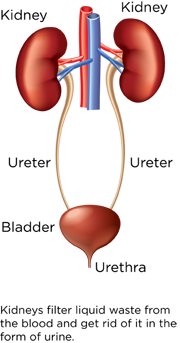How the Kidneys Work

Kidneys are a pair of organs shaped like kidney beans. In children, they’re each about the size of the child’s fist.
The most important job of the kidneys is to filter liquid waste from the blood and get rid of it in the form of urine. Kidneys are part of the body’s urinary system.
Each kidney contains millions of tiny structures called nephrons. The nephrons act as filters and work continuously to perform several important functions in the body:
-
Filtering waste from the body
The kidneys produce urine to carry the liquid waste and extra fluid they have filtered out of your child’s body. The urine travels from the kidneys through tubes called ureters to your child’s bladder, where urine is stored. When your child goes to the bathroom, urine passes out through the urethra.
-
Maintaining chemical and fluid balance
The kidneys help balance the chemicals in your child’s blood, such as sodium, potassium and calcium, by controlling the volume of fluid in the body.
Proper balance is necessary for other systems in the body to work well. An imbalance may affect various organ systems.
-
Regulating blood pressure and helping produce red blood cells
The kidneys produce hormones that help regulate blood pressure to keep the heart beating normally. They stimulate the production of red blood cells, which deliver oxygen to cells and take away waste products from all the cells in the body.
Red blood cells grow in bone marrow, the soft center of bones. Kidneys stimulate the production of red blood cells, and thus kidneys help bones stay healthy.